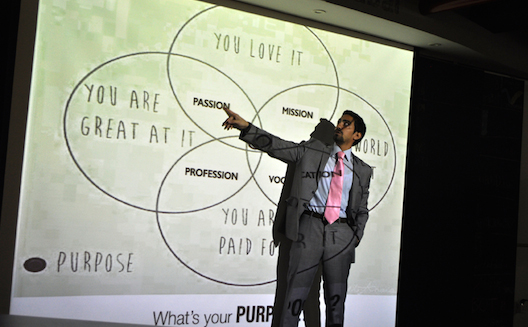How to pitch your idea in less than a minute


Rabih in communication mode.
Elevators are remarkable feats of engineering. They have revolutionized the way we think of mobility and constantly help us reach new heights. In Dubai, the Burj Khalifa elevator can take you to the 124th floor in under a minute. More than enough time to seal the business deal of a lifetime.
A ride to heaven… or through hell
The elevator pitch is known in popular culture as a short, compelling monologue that captivates the attention of an important person; one that could potentially be interested in your business or idea. As you enter the lift, the countdown begins for you to either impress or disappoint by the end of the ride.
Needless to say, entrepreneurs often obsess about crafting that perfect elevator pitch, to which a prospective investor will reply “shut up and take my money” by the end of it. But many entrepreneurs end up panicking when facing a big shot, and ruin a golden opportunity to connect with an influencer.
So how does one go about preparing a winning elevator pitch?
Time is of the essence
It all begins with a confident mindset. Picture yourself walking into the sunset at the end of a Hollywood blockbuster. You need to convey that you mean business from something as simple as the way you walk. Because the whole point behind pitching a business or idea is to generate a positive response from listeners in the quickest way possible, flash a confident grin, briefly introduce yourself, and get down to business.
So, it’s highly recommended to tailor different versions of your pitch for different circumstances and audiences: a relaxed two-minute pitch where you go through your business proposition as well as your collected data and future strategies; an abridged one-minute version where you establish the problem that you’re trying to solve and start revealing your miracle solution; or, an express thirty-second one where you create a sense of intrigue in the mind of your listener and get them interested enough to ask for more details.
I even challenge you to pitch your business or idea in ten seconds. If you can write about it in 140 characters or less on Twitter, you can definitely say it in ten seconds - or maybe less.
Keep it simple
After listening to your elevator pitch, one should be able to easily understand what your business, or idea, is all about. One should also be able to gauge how the proposed business, product, or service is going to affect them. And one should also be able to understand your business logic, bearing in mind that different audiences would be looking for different elements in your pitch: investors would be interested in how you would make money and scale up; potential business partners would be keen on identifying with your vision of things; and media representatives would want to convey a sensational story that has a broad appeal with people.
Remember though, despite the intricate nature of the above pitch elements, simplicity should remain your first and foremost priority. Look at the famed keynotes addresses of the late Steve Jobs: visual simplicity was always coupled with an easily-digestible story, one where a non-technical person “gets it” and feels empowered as a result.
Preparation tips
A good way to evaluate the ease of your pitch is by writing its script word for word, then reading it out loud. This shouldn’t be done in order to memorize your pitch verbatim: you should always prioritize the here-and-now in public speaking. Rather, this simply helps structure your ideas and ensures that it flows.
Once you sense words are getting heavy on the ear, or that you’re having a hard time with pronunciation, stop and reflect on your word choices and overall syntax. Having a speech buddy helps as a mock audience, as well as someone to point out such heavy words.
Another way of achieving simplicity is by adopting a conversational tone of voice. Let your pitch flow by crafting a story-like structure; asking yourself questions for the audience to identify with; or simply talking about it all like you would talk to a friend over coffee. A great example of conversational simplicity was recently made by the 2014 World Champion of Public Speaking in his winning speech.
Reach that level of effortless ease and you can win over any audience.
A means to an end
Most importantly, ensure wrapping up any impromptu meeting by getting something out of it: a scheduled meeting, a business card, or simply a name. An elevator pitch should always win you something, even if that boils down to a confidence boost or grilling questions about your business.
A word of caution: a killer elevator pitch should not be developed for its own sake. You might enjoy the ride and become good at wooing audiences with well-rehearsed pitches, but having strong entrepreneurial acumen and a solid business case nearly always come out on top in the minds of investors.
So remember that an elevator pitch is only a means to getting a second meeting.
One to really seal the deal.


